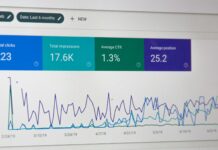The retail industry is undergoing a significant transformation. This change has moved from traditional shelf displays to digital screens, marking the dawn of a new era in shopping experiences. The digital revolution in retail is reshaping how we buy, sell, and interact with products and services.
The Shift to Online Shopping
In recent years, there has been a noticeable shift towards online shopping. Consumers now have the luxury of browsing products from their homes. E-commerce platforms offer a large selection of items that can be compared and purchased with just a few clicks. This ease has led to an increase in online sales, forcing brick-and-mortar stores to rethink their strategies. Today, even lottery companies focus on their presence in the world wide web, allowing users to buy online lottery tickets with a few clicks.

Integration of Technology in Stores
Physical stores are not left behind in this digital revolution. Many are integrating technology to enhance the customer experience. For example, interactive kiosks allow customers to check product availability or locate items within the store. Augmented reality (AR) apps enable shoppers to visualize products in their space before purchasing.
Personalization through Data Analytics
Retailers are using data analytics to better understand consumer behavior. By analyzing shopping patterns, retailers can personalize the shopping experience for each customer. Thanks to the insights gained from data analytics, recommendations, targeted promotions, and personalized discounts are becoming commonplace.
Mobile Payments and Checkout-Free Shopping
The way we pay for goods is also changing. Mobile payment systems make transactions quicker and more secure. Some stores have even introduced checkout-free shopping, where customers can pick up items and leave the store without waiting in line to pay. Sensors and AI technology automatically charge their accounts as they exit.
Social Media and Influencer Marketing
Social media has become a powerful tool for retailers. It allows them to market directly to consumers, receive instant feedback, and engage with a broader audience. Influencer marketing has also taken center stage, with brands partnering with social media personalities to reach potential customers in a more relatable and authentic way.
Sustainable Practices and Ethical Consumerism
Digital retail also focuses on sustainability and ethical practices. Consumers are increasingly aware of the environmental impact of their purchases. Retailers respond by offering eco-friendly products and transparently sharing their supply chain processes. Digital platforms make it easier for consumers to make informed choices that align with their values.
Challenges and Opportunities
While the digital revolution presents many opportunities, it also comes with challenges. Cybersecurity is a major concern, as the increase in online transactions leads to a higher risk of data breaches. Additionally, the competition in the digital space is fierce, with retailers constantly needing to innovate to stay ahead.
Conclusion
The digital revolution in retail is transforming the industry at an unprecedented pace. From the integration of technology in physical stores to the rise of e-commerce and sustainable practices, retailers are adapting to meet the evolving needs of consumers. As we continue to witness these changes, one thing is certain: the future of retail will be a blend of digital innovation and customer-centric experiences.





















